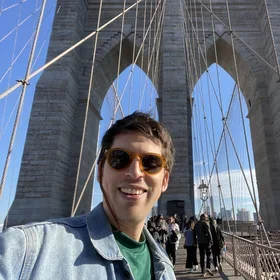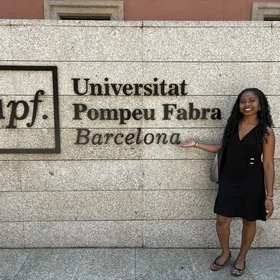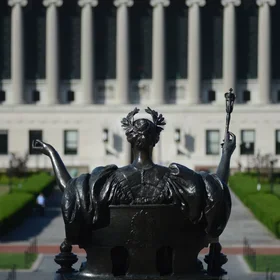Oche Oche-Obe, a former technology consultant at EY in Nigeria, has long been passionate about data and problem-solving. After gaining hands-on experience in the consulting field, Oche decided to pursue an M.S. in Applied Analytics (APAN) from Columbia University. His engineering background, which emphasized precision and analytical thinking, inspired his transition into the world of data. Last fall, Oche was appointed an at-large representative in the SPS Student Government, further demonstrating his leadership and commitment to the SPS community.
In a recent interview with SPS, Oche reflects on how his engineering and consulting experiences shaped his approach to analytics, the value of hands-on learning at Columbia, and his aspirations for using data to drive impactful solutions.
What initially sparked your interest in analytics, and how did that lead you to this program?
I’ve always enjoyed looking at numbers and statistics. I love geography, and I remember studying the census and demographic data of different countries and trying to understand population distribution. When I first got a Spotify account, I did my own version of Spotify Wrapped before it became a thing—simply because I like having an understanding of my listening habits through numbers. I’m also very interested in technology, which is why I initially studied electrical engineering and then became a technology consultant. I noticed over time how much data and its applications kept growing in the tech space, and I knew it was time for me to dive deeper and learn more about synthesizing data.
How would you describe the academic experience in the APAN program?
The program explores a broad spectrum of the analytics field. The core courses lay a foundation for what you should know to get started, and the electives allow you to tailor your curriculum to align with your personal interests. The lecturers in the program have experience in various parts of the analytics field and are available for you to learn from and gain insights about what part of the data world really captures your interest.
Can you share a specific project that pushed you outside your comfort zone?
The “Predictive Analytics Competition in Frameworks & Methods” assignment was a significant project for me. It is a data modeling competition across the entire cohort during the first semester of the program, complete with a leaderboard ranking based on your best model’s performance. While I had prior coding experience and a foundational understanding of machine learning, the class was my first experience coding with R and really diving deep into data modeling concepts. I had to double down and push my limits if I wanted to rank high among more than 400 people! That experience set the tone for me moving forward––that I was going to have to go above and beyond wherever possible throughout the course of the program.
Has your study of analytics affected your approach to engineering?
Engineering is a lot about precision, known concepts, and tried and tested methods. I sought this advanced degree so that I could not only be able to solve problems but also have a better understanding of what causes those problems in the first place and for whom I am solving those problems. Engineering is very technical; you get to tinker with parts and code, but if you want to build something bespoke, you need a better sense of how to tailor that solution. You can use a method like CRISP-DM to build data models, but that process of fine-tuning your model to get the best out of it for your use case—that is where you need to get analytical and consider everything.
Have you found any intersections between analytics and engineering that you didn’t expect?
The emphasis of my electrical engineering degree was in power systems. Even though data and power systems seem very disconnected, I have always known that you can apply data anywhere to make things more efficient (though some data applications in the energy space certainly surprised me). Not only are analysts crunching the numbers to figure out new energy-saving techniques, but also I was pleasantly surprised to see how concepts I learned in APAN like anomaly detection and predictive modeling today can help the energy industry predict faults and alert companies to address them before they materialize. Maybe it is well known in that space too, but you can use data from smart meters across an entire grid to carry out load balancing more efficiently based on the time of day or season of the year. Engineering taught me the basics; analytics showed me how best to apply those concepts in practical situations.
What skills from your consulting work helped you succeed in the program?
The skill from consulting that helped me the most through this program was people skills. I owe a large part of my success in the program to the relationships I was able to build with my peers. Today, AI gets a lot of buzz as something that will take jobs and boost productivity, but I think that will only elevate the value of genuine people skills moving forward. Being authentic and being able to share that natural emotion to get the best out of people is something that AI won’t be able to replicate in the near future. I used that skill to guide my capstone project while serving as my team’s project manager, and on the last day of my program, in my Analytics & Leading Change class, I was among the top 10 highest scorers in a simulation aimed at instilling data-driven change within an organization. Technology is a tool; the real value is in people’s ability to wield those tools and aid others in using those tools to advance society.
About the Program
Columbia University’s Master of Science in Applied Analytics program prepares students with the practical data and leadership skills to succeed. The program combines in-depth knowledge of data analytics with the leadership, management, and communication principles and tactics necessary to impact decision-making at all levels within organizations.
The fall 2025 application deadline for the M.S. in Applied Analytics program is June 1. Learn more about the program here. The program is available full-time and part-time, online and on campus.


